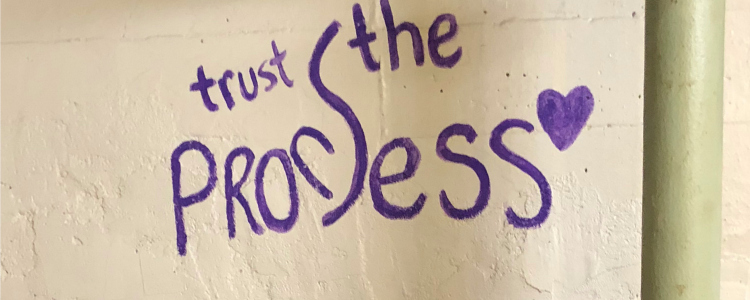Top 5 Myths about Atypical Anorexia
1. People with atypical anorexia are a normal body size, or juuuuust over the weight limit for an anorexia diagnosis.
To tackle this myth, we have to start with an understanding of fat phobia and thin privilege. The eating disorder treatment and recovery field exists in a world riddled with weight discrimination. A significant amount of those suffering from this disorder never receive treatment due to this stigma of weight bias. The truth is that a restrictive eating disorder does not have “a look.” The only difference between a diagnosis of anorexia nervosa and atypical anorexia is the weight. That is it.
This is not a diagnosis only reserved for the select few who are just a few pounds over the recommended BMI cutoff for anorexia. No. This diagnosis encompasses a huge swath of people of varying weights. I was considered “morbidly obese” when I was diagnosed.
2. They’re just not a person with “real” anorexia yet.
Restricting does not always lead to weight loss, and the way your body adapts to not eating is highly dependent on genetics. Read that again. And again. I am still drilling this into my own head to be honest. The ugly truth of it all is that most people do not look like those “to the bone” Hollywood versions of anorexia. When you restrict your intake over time, your body changes how it uses the energy you are taking in. It says, “Oh shit, it’s famine time!” Regardless of your weight, your body will start storing energy differently. It doesn’t matter if you have a ton of extra weight stored already, your body will store more. Your metabolism will slow down, and you will gain weight. And then you will restrict more, thinking that you still need to do better with your “diet.” It is a self-defeating cycle.
3. The health consequences are not as serious as someone with anorexia.
Your body might look different, but what is happening in the inside is virtually identical to someone with a lower BMI. I had the wakeup call of a lifetime in treatment when I learned my body was falling apart from long term restriction. I was incredibly lucky to go to treatment somewhere that understood that weight had nothing to do with what was going on inside my body. The science doesn’t lie, and I needed to see that data to understand the extent of the damage I was doing to my body. They did metabolic testing, which showed I was using protein stores for energy, instead of fat I already had stored. This meant my body was taking from lean muscle mass, my immune system, and my organs for energy, instead of the nutrients I was taking in. An EKG showed an irregular heart rhythm that is consistent with restriction. No one had bothered to test for this before. My bone density test showed osteopenia, the condition that comes before osteoporosis. No one had bothered to test for that before either. These are tests that they do pretty much automatically when someone presents as underweight. We see someone who is underweight and we say, “You must be dying! Stop starving yourself!” But when we see someone who is in a higher weight body and restricting, we say “Keep going, it is good for your health.” It is because of this fact, this discrepancy in treatment and reaction from society, that I believe atypical anorexia can sometimes be even more dangerous. No one tells you you’re harming your body. No one tests for the important health markers. No one realizes.
4. They have totally different recovery side effects/struggles.
We need to talk about the ugly sides of recovery. The gastrointestinal issues, the skin changes, the changes in hunger and fullness cues, the weird cravings, the intense emotional experience that goes along with all of this. Within the eating disorders recovery community, there is a lot of support and resources available for those restoring/gaining weight that talk about these less than pleasant side effects. I’m glad that those individuals can find so much support online, but I have seen little to no resources that explicitly mention that these things will happen no matter your weight. What a fun surprise! Gastroparesis is a nightmare. It is the feeling you get of being full after only a few bites of food, and the feeling of the food being kinda stuck along the way through the system. This is incredibly common. Digestive enzymes, peppermint essential oil/tea, and deep breathing are lifesavers for me. One night, I had such intense stomach pain and heart palpitations that I landed myself in the emergency room. The best part of that story was that when I texted a friend, she asked if it was from gastric bypass surgery. That was her first assumption. Nope it was not. Definitely not that.
5. They don’t need as intensive treatment.
While most people with atypical anorexia will not get intensive treatment, most do need it. My partial hospitalization/residential program saved my life, and the only reason I finally ended up there was because of my kick ass treatment team that understood the severity of this illness, regardless of weight. I would have gone earlier, and gotten the full stay I needed, but fatphobia and these myths about my illness kept me from seeing it as necessary or even possible. I sometimes wonder what would have happened if I did not ever go to a higher level of care. That is a scary thought. I didn’t want to need it, but I did. I needed people to literally make me eat normally, to take the control away from me, and to challenge me. I needed time to literally help my body repair itself.
So, what myths do you believe, and how can you challenge them?
Molly Gwen is passionate about advocacy, mental health, music, science, and neuropsychology. She works in the counseling field and hopes to start her Ph.D. in clinical or counseling psychology in the next few years. Crushing diet culture and fighting societal oppression is her side hustle. Her blog is https://mollyinprogress.home.blog/ and her instagram is @mgsrobbins and @mollyinprogress.
This piece originally appeared on https://mollyinprogress.home.blog/ and was republished with permission.





